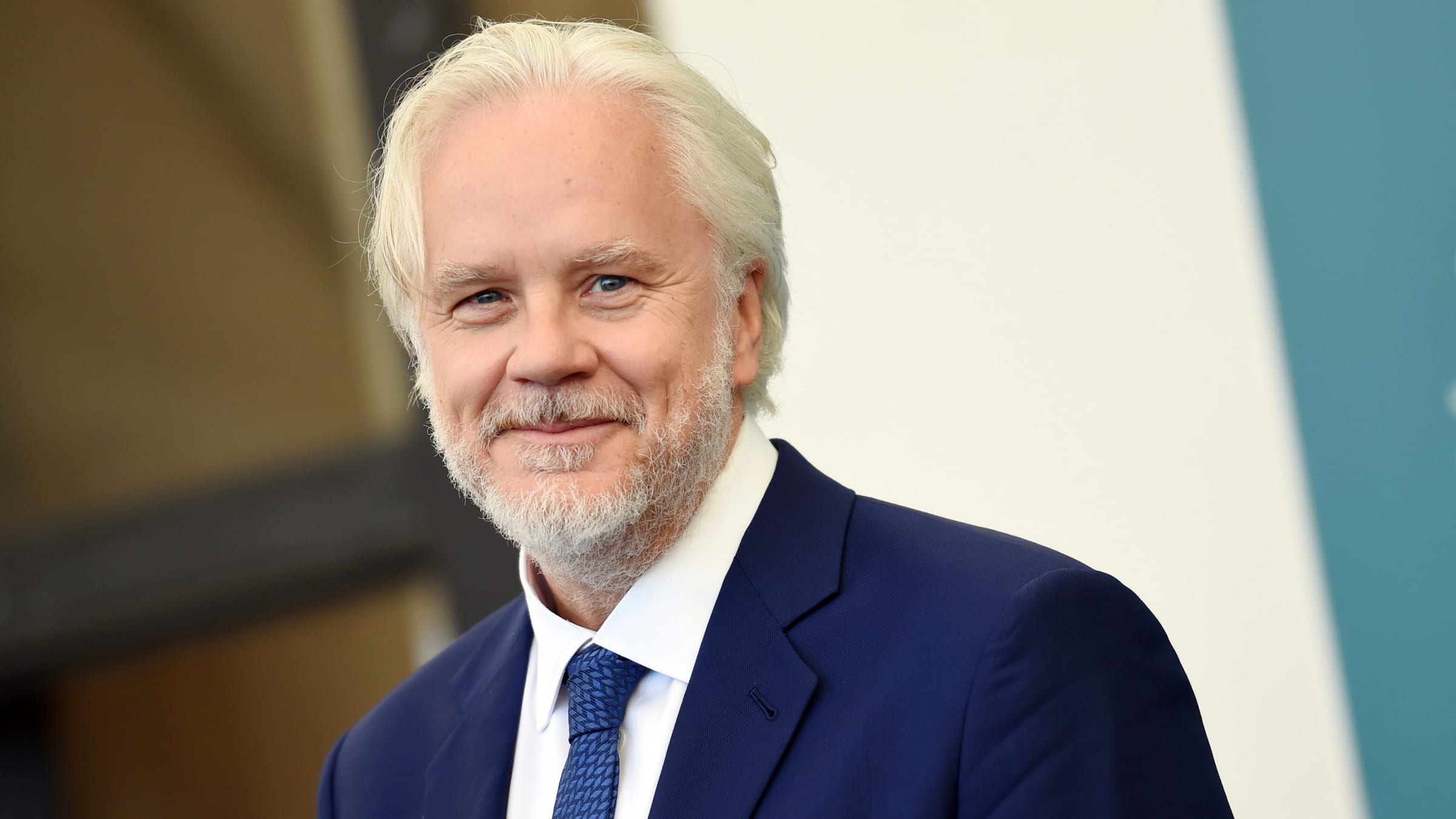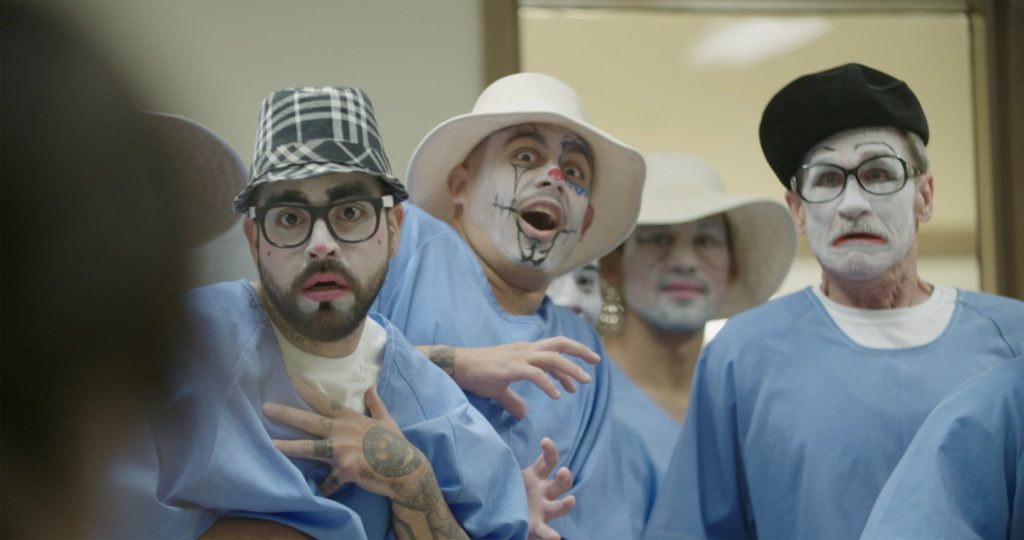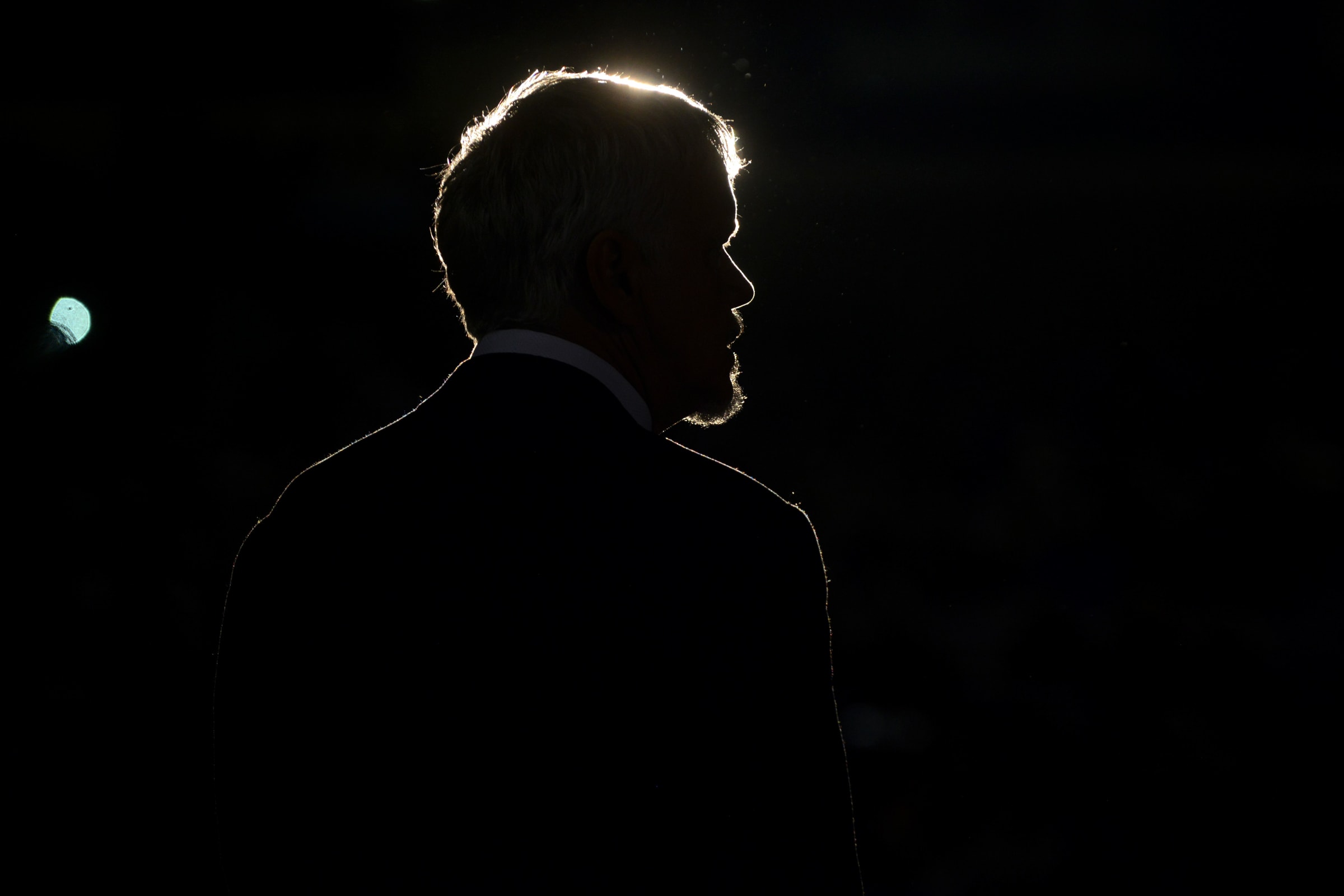The Oscar-winning actor/filmmaker opens up to Marlow Stern about his new film “45 Seconds of Laughter,” infighting on the left, and those pesky 2006 GOP donations.
By Marlow Stern | Senior Entertainment Editor |Updated 10.04.19 4:15PM ET / Published 10.04.19 5:01AM ET
Updated 10.04.19 4:15PM ET / Published 10.04.19 5:01AM ET
Tim Robbins has become synonymous with prison dramas.

There was The Shawshank Redemption, the revered Stephen King adaptation that turned 25 last month, followed shortly by Dead Man Walking, where he directed his ex-partner Susan Sarandon to the Best Actress Oscar. The guiding theme of these works is empathy—how inmates shouldn’t be fully defined by their sentences and are human beings capable of redemption. 45 Seconds of Laughter, Robbins’ latest turn behind the camera, follows in kind.
Set at the Calipatria State Prison, an all-male maximum-security facility in Imperial City, California, the documentary, which made its North American premiere at the New York Film Festival, is a fly-on-the-wall account of The Prison Project, an offshoot of Robbins’ theater troupe The Actors’ Gang, which teaches acting workshops to the incarcerated, allowing them to access their emotions, form bonds, and break down barriers. Robbins’ group trains the men in Italian commedia dell’arte, and the film chronicles the rehearsal and staging of a performance for their friends and family members, from summer to Christmas.
“What it does in training is, it frees the actor from having to create a character out of whole cloth,” Robbins tells The Daily Beast of the commedia dell’arte technique. “The actor can choose any one of the characters, and this allows them to get at the essence of what we’re trying to do, which is to connect to a deep emotional truth.”
Over the course of our winding chat, Robbins opened up about our iniquitous criminal-justice system, why The Shawshank Redemption has stood the test of time, his controversial politics, and much more.
How did The Actors’ Gang get involved with The Prison Project?
Almost fourteen years ago, one of my actresses, Sabra Williams, came to me and asked if she could start this work in prison. For me, it seemed like a natural extension of the work that we had been doing with the method of acting that we use, since we had already been doing it in schools. So, I gave her some money to start a pilot program and checked in on it. We soon realized, after making some adjustments, how effective it could be as a form of rehabilitation. We noticed a change happening with the people we were working with, and as we got better with it, we came to understand the power in the work, and the effectiveness of the work.
First off, eye contact. Getting guys from rival gangs to work in the same room to achieve a common goal, and doing it successfully, and seeing how the barriers started to break down was a shift for us. Something about the way that we train actors was translating into something that was truly effective for these gentlemen, and consequently, for the women we worked with as well.
In 45 Seconds of Laughter, we don’t know what the men were put in prison for. Did you feel omitting that information made for a purer viewing experience?
We never know. We don’t want to know. For us, it’s essential to walk into those rooms without judgment, and to operate these workshops in a collective way that isn’t about “teacher knows everything, student knows nothing.” In fact, we try very early on in the workshop to infuse the voices of the people we’re working with as a legitimate voice, so that’s why we always check in after exercises to see how they’re thinking and feeling. I think it’s an anomaly to them; it’s not something they’re used to, to be treated with respect, and it helps in breaking down these barriers. I’m of the opinion that, as Sister Helen Prejean says, “Every person is worth more than their worst act.” I have met many, many people in prison who know exactly what they’ve done, aren’t questioning whether they should be in jail for it, but are looking for a way to change the direction of their life. For me, the future is essential and what happened in the past is not relevant to the work we’re doing.
Between this, The Shawshank Redemption and Dead Man Walking, your career’s inextricably linked to prison, and to the plight of the prisoner. Why do you think that’s happened?
I think the reason why I was able to approach the role in Shawshank Redemption the way that I did was connected to my upbringing. I grew up in Greenwich Village in the late-‘60s and early-‘70s. It was fun, complicated, dangerous, groundbreaking, but the thing that I haven’t seen in the story about Greenwich Village at that time was how complicated the cultural dynamics were between second and third-generation Italian and Irish and bohemians, hippies, folk singers, etc. I went to a Catholic school with a bunch of kids, some of whom were pretty tough, and you had to learn how to run or fight. There were certain routes you would take when you were walking the streets, certain places you knew to avoid because a potential fight existed on that street. I grew up around a culture of survival and crime, and growing up in that environment demanded choices. Luckily I made the right choices, but some of my friends made the wrong ones and wound up in the system. So I never felt far removed from those that wound up in prison. When I was looking at portraying Andy Dufresne, I went in with a lack of judgment on who these people were that were incarcerated. There’s always a possibility for a place on the beach in Zihuatanejo, and that’s something that people want to hold on to.
Why do you think it’s endured the way that it has? It’s really considered by many to be a modern classic.
I’m not sure exactly what it is. I know that it gives me hope that it has endured, and that it’s important to so many people. At the core of it, there’s a forgiving heart and a sense of empathy. There are very few films that are about the friendship of two men. And I also think that the enduring theme of that film that resonates with so many people is that, despite what you are surrounded with in your life, despite the paths you may have taken or the bad luck you may have had, that there’s always hope; there’s always a possibility for a place on the beach in Zihuatanejo, and that’s something that people want to hold on to.
It’s one of the most non-judgmental films about people in the system. It humanizes them and doesn’t pass judgment on them.
And to understand how cool that is, that’s all happening at a time when, as a society, our politicians and our media were demonizing criminals, and criminalizing behavior that hadn’t been criminal before—I’m talking about the criminalization of marijuana in the ‘60s. All of this reaction to the film of Shawshank was happening when we were incarcerating more and more people than ever before, and you remember the rhetoric: gotta be tough on crime. And this was across the aisle, both Republicans and Democrats. You gotta be tough on crime, increased sentencing laws, mandatory minimums, lack of discretion for judges in particular cases to be more lenient, and what wound up happening was we wound up over-incarcerating non-violent criminals for very long periods of time.
When I was doing Shawshank I talked to the prison guards, and this was in ’93, and I asked them, “What do you think is wrong with the system?”—and mind you, this is Mansfield, Ohio, and I’m talking to conservative prison guards, and they said, “Well, the government should legalize marijuana.” I asked, “Why?” and they said, “Because we are incarcerating non-violent teenagers into a system filled with violent felons, and we’re putting them in for two years, there’s a two-year waiting list on any GED or job-training programs, so we’re essentially putting these kids into a crime school.” They were very clear about that. And this was all because of politicians wanting to appear to be tough but not considering the consequences of their legislation.
You got a ton of shit for speaking out against the Iraq War, and for being one of the most outspoken celebrities when it came to Iraq. Do you feel somewhat vindicated for that now?
Listen, you don’t get any prizes for being right in this country. In fact, many people that got it wrong, the consequences of which were hundreds of thousands of deaths, many of these people that got it wrong did not suffer any consequences for that—in fact got promotions. Some of them are still around on the news channels.

New York Film Festival
It’s pretty maddening to see former Bush administration officials on the news. You have Nicolle Wallace hosting a show on MSNBC, David Frum as an MSNBC contributor and senior editor of The Atlantic. I mean, this is the “Axis of Evil” guy. These people are acting like authorities on politics with these huge platforms and they were central cogs in one of the worst administrations ever.
I totally agree with you, and you should write that! Meanwhile, by the way, you will never see Noam Chomsky on MSNBC. And by the way, the highest-rated host on MSNBC had his show taken off the air because he had voices on that were opposing it, and that’s Phil Donahue. It’s funny, because you can stand out against a lot of issues and not get a lot of heat for it—except for war. War seems to be the one issue where everyone seems to climb onboard right away. It just happened in Venezuela recently, and thankfully there’s some resistance to this crazy talk about going to war with Iran, but it seems to me that this is limiting freedom of speech. It’s you can speak out about a lot of things but don’t criticize going to war because there will be consequences.
Do you regret supporting Ralph Nader in 2000?
Not at all.
No?
No. I regret that the Democratic Party didn’t fight harder and the Supreme Court made them stop counting votes. I think they should have fought that. And I have to say, I don’t like groupthink of any kind, and I don’t buy into this blaming of anyone that supports the third party and that’s why we’re in the situation we’re in. You can never assume that someone who voted for Nader—or voted in the last election for Jill Stein—was going to vote for Al Gore or Hillary Clinton. That’s an assumption you don’t have the right to make. I voted for Hillary Clinton from a defensive posture, because I knew from living in New York what an awful person Trump was, but I don’t get why there’s such a rabid … in order to change this and make sure it never happens again, I think some self-reflection is in order, and when you have Super PACs like the one David Brock runs whose sole purpose is to attack and marginalize people on the left for not falling in line, you shouldn’t be surprised that those people aren’t enthusiastic about your candidate. I don’t understand why there’s so much energy being used right now to attack one of the most popular candidates running right now with one of the biggest bases of support.
You’re talking about Warren or Bernie?
I’m talking about Bernie. Say what you will about him, whether you want to support him or not I don’t care, but I don’t understand the strategy, because this is your base! These are the people knocking on doors that could make a difference in an election, and to be marginalizing them and attacking them because they support a candidate that you don’t like, for me, is not very wise. I don’t understand it. I just want to say that if you want to talk about unity and stopping this movement toward fascism, you can’t be attacking people that could change things.
Say what you want about Bernie but it’s undeniable that he’s completely recalibrated the Democratic Party and pushed their agenda further to the left.
You talk about experts that are on our news channels, and I’m sorry but they got it wrong the last time. I would like to see some self-reflection and some humility. It’s something that needs to happen in order for us to not wind up in this situation again, but I don’t see a lot of self-reflection. I see them being touted as “experts” again and I fear that we’re headed down exactly the same road that got us into this in the first place.
Many of your political moves have made sense but the one thing that confused me was the 2006 political donations to Republican congressional candidates like Michele Bachmann. It just seemed out of character, at least from an outsider’s perspective, and I’m curious how those came to be.
Um … yeah, I think we’re all allowed to make a mistake or two. And by the way, none of them would give refunds. Honestly, there’s no … I made a mistake.
But what even led you to do that?
I think it had something to do with the Democratic candidates they were running against having supported the Iraq War, and I must have read an article suggesting that these people were moderates and blah blah. What I find curious about this is, it’s a $500 donation and I’ve talked about this so much. I’m always curious when people bring it up because for me it’s a non-issue, and I think in bringing it up people are trying to say that I’m a supporter of Republicans, which is not true.
I don’t think anyone believes you’re on the side of Republicans. But it is a strange blurp.
It is a strange blurp but … how many years ago was that? Thirteen years ago and we’re still talking about it? I don’t get it. Is it to discredit me, is that what it is?
It’s not to discredit you but it’s something I’ve been curious about because it seems pretty inconsistent with your views, and I’ve never had the chance to discuss it with you so I was curious how it came to be.
Well, it’s something that I regret and as I said, I’ve asked for refunds but they never gave any.

You initially backed Bernie in 2016. Are you still on the Bernie train for 2020?
I’d rather not talk about that right now because I want people to see this film, and in January I’m going to be traveling around the country with The New Colossus, a new play I’ve developed about immigration. I’m really looking forward to that dialogue opening up.
Can you tell me a little about that?
It’s 12 actors from 12 different parts of the world speaking in 12 different languages about their ancestors’ migration from oppression to freedom. I have an acting company with people from all over the world, and we started this project a couple of years ago. It’s essentially the story of us; the story of what the circumstances are for people who choose to leave their home countries and find a way to this country. And at the end of the show, I or someone else comes out and we check in with the audience and ask, “How many people here are Native American?” Hands go up. “How many people’s ancestors were brought here against their will?” More hands go up. “Are there any refugee immigrants in the audience?” People hold up their hands, and I ask them where they’ve come from. “Are there any children of immigrants or refugees?” “Grandsons or granddaughters of immigrants or refugees?” More hands go up. And within a few minutes, the entire audience has raised their hand. And then I ask people to share some of their ancestors’ experiences, and we hear extraordinary stories about the amazing courage it takes to leave your mother country, and then have the strength and tenacity to make it through the border, and then to have the strength, tenacity, health and courage to travel to a brand new place and start a new life, and then have the strength to survive there. That is the DNA of our country. We should be talking about immigrants and refugees as people who are deeply inspiring to all of us, and it should be celebrated as an act of courage. These people are fuckin’ heroes.